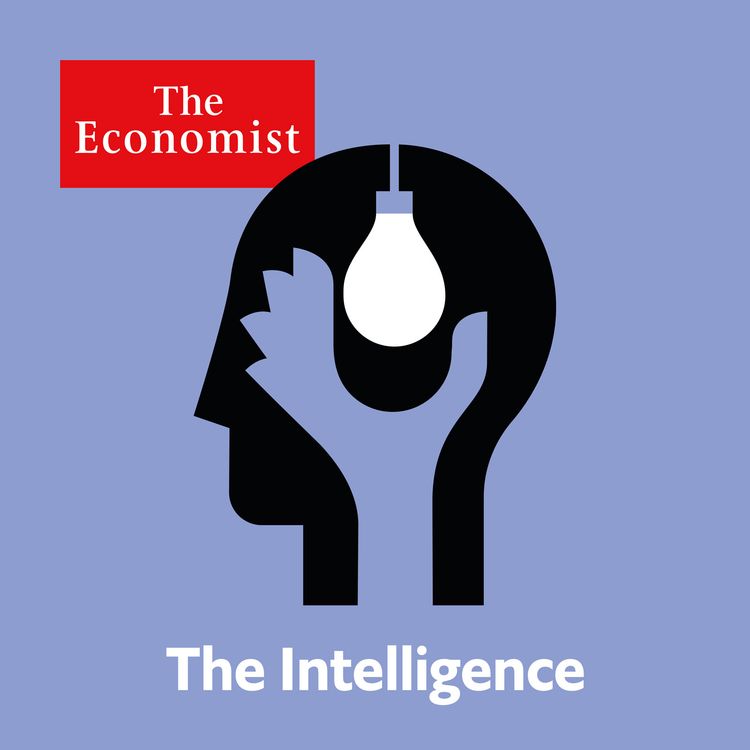Share

The Intelligence from The Economist
What’s yours has mines: the Gulf of Oman attack
•
America has blamed Iran for yesterday’s tanker attacks in the Gulf of Oman. If that’s true, Iran is playing a dangerous game that involves the whole of the region. The violent militias that control much of Rio de Janeiro might be easy to beat if they weren’t so well-connected. And, a breakaway hit reveals the racial fault lines in country music.
More episodes
View all episodes

Tomes will tell: books that predict the future
36:05|Some people read books to escape. Others turn to them for instruction. As the new year looms, our correspondents – and listeners – consider which titles can help forecast what’s coming next. Picks include “Rainbows End” by Vernor Vinge, “Nuclear War” by Annie Jacobsen, “Not the End of the World” by Hannah Richie and “Orbital” by Samantha Harvey. This is a full list of the books mentioned in the show:“Rainbow’s End, A Deepness in the Sky and A Fire upon the Deep” by Vernor Vinge“Ageless” by Andrew Steele“War” by Bob Woodward“Nuclear War: A Scenario” by Annie Jackobson“1984” by George Orwell“On Freedom and On Tyranny” by Timothy Snyder“A Psalm for the Wild-Built” by Becky Chambers“Qualityland” from Marc-Uwe Kling“Ministry of the Future” by Kim Stanley Robinson“Severance” by Ling Ma“Land of Milk and Money” by C Pam Zhang“The Broken Earth Trilogy” by NK Jemisin“Not the End of the World" by Hannah Ritchie“Orbital” by Samantha Harvey“The Heart is a Lonely Hunter” by Carson McCullers“Ancillary Justice” (The Imperial Rasch Series) by Ann Leckie“The Battle of Dorking” by Sir George Chesney“War of the Worlds" by HG WellsListen to what matters most, from global politics and business to science and technology—Subscribe to Economist Podcasts+For more information about how to access Economist Podcasts+, please visit our FAQs page or watch our video explaining how to link your account.
Good moos: cows could help the climate
23:46|Cows produce far more milk in rich countries than in poor ones. Our correspondent explains how beefing up bovine productivity could feed more people and reduce planet-heating emissions. Why Spain is the best-performing rich-world economy of 2024 (11:28). And remembering Harold Palmer, the Northumbrian hermit (17:12).Get a world of insights by subscribing to Economist Podcasts+. For more information about how to access Economist Podcasts+, please visit our FAQs page or watch our video explaining how to link your account.
The club rules? India’s RSS
23:30|Is it a community-minded boys’ club, like the Scouts? A breeding ground for seething Hindu nationalism? A paramilitary puppetmaster of India’s governing elite? Our correspondent attends the annual bash of Rashtriya Swayamsevak Sangh. As Gulf countries diversify away from oil, their leaders are shifting their focus to science and innovation (11:03). And introducing our word of the year for 2024 (17:01).Get a world of insights by subscribing to Economist Podcasts+. For more information about how to access Economist Podcasts+, please visit our FAQs page or watch our video explaining how to link your account.
The Weekend Intelligence: A year in the making – Part 1
23:11|Today and next week, we’re going to be revisiting some of our favourite episodes and hearing what’s happened to the characters since we met them. We’ll also be talking to the correspondents who reported them, lifting the lid on how these stories make it to you every weekend. In part one, Rebecca Jackson catches us up on how the Proud Boys are feeling after Donald Trump’s election win, a former soldier in Ukraine tells us about life after the army, and we hear from Luna, the XL Bully.Listen to what matters most, from global politics and business to science and technology—Subscribe to Economist Podcasts+For more information about how to access Economist Podcasts+, please visit our FAQs page or watch our video explaining how to link your account.
Country of the year: The Economist picks
27:53|In the past 12 months, there has been no lack of news. Editors at The Economist have picked their way through the rubble to uncover some optimism: which country has seen the greatest improvement this year? After fierce debate, the decision is conclusive. And our correspondent joins an unusual rescue mission: the pet railroad to a new life (17:00). Listen to what matters most, from global politics and business to science and technology—Subscribe to Economist Podcasts+For more information about how to access Economist Podcasts+, please visit our FAQs page or watch our video explaining how to link your account.
Between Estonia and a hard place: NATO meets
23:40|At the icy border between Russia and Estonia, the anxieties of NATO member states are clear, our correspondent reports. Leaders there have been debating defence spending and worrying about America shifting its support. Young people are seeking out spirituality on their phones (9:43). And why the iconic Californian condor is under threat (16:47).Listen to what matters most, from global politics and business to science and technology—Subscribe to Economist Podcasts+For more information about how to access Economist Podcasts+, please visit our FAQs page or watch our video explaining how to link your account.
Mass graves: revealing Syria’s horror
29:09|Ten days after the fall of Syria’s dictator Bashar al-Assad, the full brutality of his rule is being uncovered. Our correspondent travels to a site near Damascus, thought to be a giant mass grave. Will France’s new prime minister restore stability (14:37)? And The Economist’s guide to the best films of 2024 (21:28).Listen to what matters most, from global politics and business to science and technology—Subscribe to Economist Podcasts+For more information about how to access Economist Podcasts+, please visit our FAQs page or watch our video explaining how to link your account.
Scholz fired: Germany calls snap election
21:57|After Olaf Scholz, Germany’s chancellor, lost a confidence vote in parliament yesterday, Germany is preparing for a snap election. Urban waste is a growing problem in India; our trash-talking correspondent visits one of the few cities that have tackled it (9:49). And Fortnum & Mason’s festive fancies help it buck the trend of failing department stores (17:06).Listen to what matters most, from global politics and business to science and technology—Subscribe to Economist Podcasts+For more information about how to access Economist Podcasts+, please visit our FAQs page or watch our video explaining how to link your account.
Off-side: Georgians reject new president
26:43|This weekend, the ruling Georgian Dream party elected a new president – but only one name was on the ballot. That sparked further street protests, as our correspondent reports. Why a new US administration will find it hard to cut costs at NASA (12:19). And the enduring appeal of the martini (19:42).Listen to what matters most, from global politics and business to science and technology—Subscribe to Economist Podcasts+For more information about how to access Economist Podcasts+, please visit our FAQs page or watch our video explaining how to link your account.